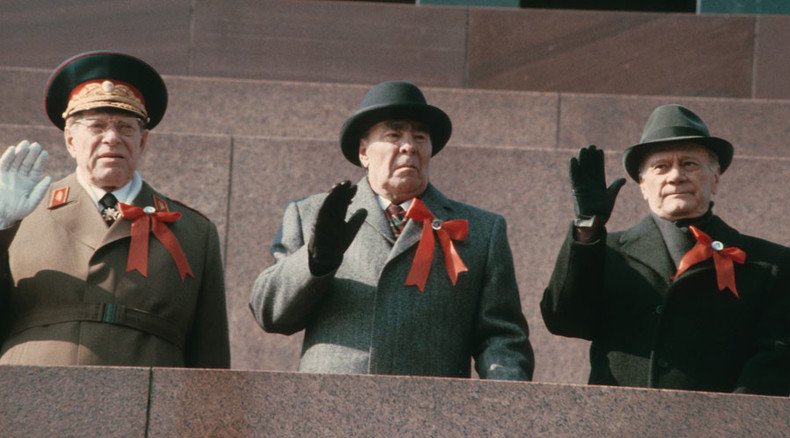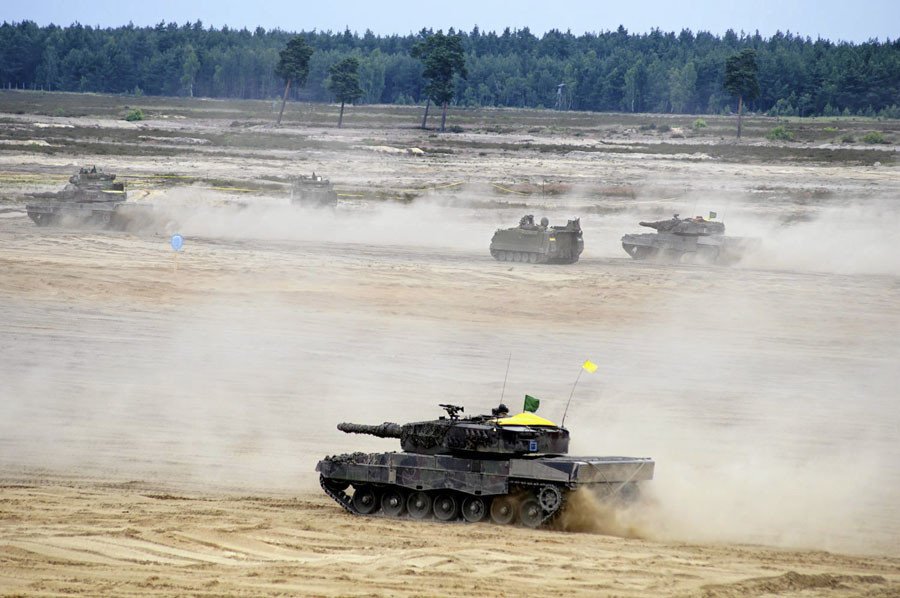The Cold War and end of certainty

Life was simple during the Cold War. Mutually Assured Destruction was horrific, but you knew where you were with it. Following the fall of the Berlin Wall the old certainties fractured, and the new enemy moved from outside the camp to within it.
I grew up in the 1970s. This was the tail end of the Cold War. Things were simple back then. The Soviets were the Reds – and red was bad.
I’m not sure what color we in the West were, but it can’t have been red. Perhaps it was blue. But whatever color it was, we were the good guys.
International relations were straightforward. The world then was like living in Manchester, a city where everyone supports either United or City. There was a certain tension, but there was also equilibrium and clarity. Everyone knew where he stood.
The evil Reds were ruled by Brezhnev. You would see him on the news being half-carried out onto the roof of Lenin’s Mausoleum once in a while where he would shake his hand and look like a constipated pontiff. Most families in the UK only had black and white TV back then so all of this seemed even drabber to us than it probably was in real life.
Brezhnev was often presented to the British public kissing other men on what looked like grey carpets in front of grey airplanes. None of our politicians kissed each other. They didn’t even seem to like each other very much.
We had some very strange teachers. One – Mr. Bradbrook – would take young girls into the storeroom and remove his toupee and show them his bald pate. It was not exactly illegal, but it was definitely odd. But when you are very young you think all the weird stuff adults do is normal. It’s only later that you look back and wonder why you never told anybody.
Mr. Bradbrook liked to talk to us about the Russians. I gleaned a working knowledge of Marxism from him equal to anything a boy of nine might need as he monologued during calligraphy classes (most of what we learned from Mr. Bradbrook was calligraphy – he didn’t care much what you wrote as long as it looked nice).
Mr. Bradbrook enjoyed telling us about the Soviets’ nuclear arsenal. According to him, much of it was targeting our school. I think he thought he was frightening us into becoming better people. But most of us just thought it was cool that the Soviets wanted to bomb our school the same as we did.
Mutually Assured Destruction was part-and-parcel of living in Britain in the seventies. Like trade unions, flared trousers or the Bay City Rollers it was something you accepted as part of the scenery. We were taught to prepare for it in the same matter-of-fact way we were trained to do everything else, from long division through to learning how to spell words like ‘tough’.
Surviving a nuclear first strike on a school day was done by dropping to the floor, turning the desk onto one side and crouching down behind it. Whatever the Russians could throw at us, it was no match for the business end of a British comprehensive school desk.
The Swiss – as everyone knew – had nuclear fallout shelters. But then they were Swiss and therefore neat and well organized. We didn’t have nuclear shelters in the UK. We only had bus shelters, and most of those were not very good.
What we did have which the Swiss didn’t was Peter Sellers. And while the politicians talked about the bomb and groups like CND protested about the bomb, it was Peter Sellers who explained to my generation what the bomb was and how to live with it. The film Dr. Strangelove or: How I Learned to Stop Worrying and Love the Bomb (1964) in which Sellers starred made it all clear.
The message was simple: obviously, nobody wants the world to end as the result of all-out nuclear war. But it might still happen. If it happens it will probably be the result of a cock-up of some kind. Or perhaps because of a rogue lunatic. But then again it might not happen. But if it does, it will be quick – better that than a long and painful disease. But there is nothing you can do about it so there isn’t much point worrying about it. And then again, it might not happen. Or it might.
This may sound confusing, but it seemed to make sense and that was enough.
Although nuclear war – or the possibility of it – made forward planning an act requiring amnesia rather more than will, planning was still possible. And since the dynamics of such a war were predicated on a clear them-and-us situation, whatever existential conundrums MAD forced you to deal with, things were still reassuring and somehow cozy. It was like mumps: you might not like it, but you knew where you were with The Instantaneous End of All Life on Earth. And like mumps, it was not the sort of thing you could catch twice.
As the seventies gave way to the eighties, life began to get more complicated. I hit adolescence which resulted in a pole shift in my priorities from whatever they had been before, to finding out about girls. I also realized that Formica desk tops were no defense against nuclear blasts.
The Moscow Olympics happened. This revealed that life in Russia not only happened in black and white, it could happen in color as well. And before we knew it, Gorby and Maggie were making out in Technicolor on a beautiful red carpet, and people were lighting candles and singing Kumbaya and pulling bits off the Berlin Wall.
It looked like war was over.

But, of course, it wasn’t. The Taliban had been installed in Afghanistan to fight the Soviets – ensuring the later emergence of such NWO change-agents as Al-Qaeda, and then ISIS.
War wasn’t over; it was just being managed and migrated to a new operating system by people like Zbigniew Brzezinski – from a polarized conflict restricted to professionals, to a generalized one which might suck in anyone.
Fast-forward thirty-plus years and the new enemies are the Muslims. Unlike in the Cold War with the Soviets, we’ve imported millions of our supposed enemies and given them citizenship. This means that instead of our guns and our suspicions just pointing outward, they are pointing inward as well.
The narrative has gone from ‘Reds under the bed’ to the notion that since nineteen Arabs armed with box-cutters brought down the Twin Towers and Building 7 and made a big hole in the Pentagon, anything Big Government chooses to do to clamp down on those who pay for it is justified.
This new war has no goal and no definition of success. It just is – with no beginning, middle, end or shape – and it follows you about like muzak round a shopping center.
In the post-Cold War world the old certainties are gone. The rise of the internet means that anyone who hasn’t spent the last twenty years in a shoe box knows that the conflicts we have rammed down our throats by the media as right and good serve geopolitical purposes which work against us almost as much as they do those who are currently catching the bullets.
By now so many people know governments take their orders from a globalist cabal that you won’t shake anyone’s world by saying so. Unlike in the Cold War when we thought Mr. Bradbrook was right and the Soviets really were aiming nukes at our school, hardly anyone believes the official 9/11 narrative or much of what follows it, except perhaps some producers at the BBC and Fox News.
Conflict has been repositioned. It is less of a direct confrontation and more of an organic and viral event. This means we get to feel vulnerable in a way we never did under MAD. With evil cast now as an amorphous, ill-defined baddy rather than a sudden cataclysmic event, the worry is not so much that it will kill you, but that it will get you and then keep you alive.
We were trained to understand goodies and baddies. But we have baddies and worsies. Something is wrong.
But we know it. The tactics the ruling elite uses to manage us are openly ridiculed and debunked within a few feet either side of the flaccid, supine narratives much of the mainstream media occupies itself with.
But our knowledge doesn’t seem to make any difference. Like the mythical Cassandra, those who take an interest in realpolitik are condemned to know the future but be unable to do anything about it. The resultant tension renders us – like Pavlov’s dog – salivating in the corner for a meal we know is never coming. Our noble souls cry out for order and clarity. But we get fed contradiction and chaos.
Nothing is straightforward anymore. While the lines which divided East and West are gone, they are also back with NATO’s push into Ukraine and US sanctions against Russia. While we are equal under Political Correctness and Tolerance, we all know that we are not. While Muslims are the enemy, they are also our friends and we should invite millions of them to live with us. While Communism has been defeated, the planks of the Communist Manifesto are openly promoted across the supposedly free West. While China is a communist country, it is the future of capitalism. And while we believe in Diversity, if you don’t conform to our standards, we will destroy your country.
It is insane. It is meant to be. The ruling elite does not talk of ‘order out of chaos’ for nothing. Chaos is the new order, and the sooner we learn to work with it, the better.
It is easy to pine for the past. And perhaps it shows how far gone we are that a time spent under the persistent threat of all-out nuclear holocaust now seems like the good old days.
I am not blandly or foolishly optimistic, but chaos cuts both ways. If all bets are off, then those who can keep a cool head and stay focused on the big picture will consider paradigms which were unthinkable before.
And it is just possible that one – or some – of the disaffected micro-tribes which will inevitably rise out the ashes of the former certainties will generate a new cohesion and vision – if not for all, then at least among their own members.
Sam Gerrans for RT
The statements, views and opinions expressed in this column are solely those of the author and do not necessarily represent those of RT.
LISTEN MORE:
The statements, views and opinions expressed in this column are solely those of the author and do not necessarily represent those of RT.













